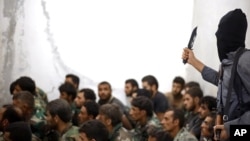Overwhelmingly, Muslims from a number of countries hold negative views of the Islamic State group, a new survey finds.
The survey by the Pew Research Center was conducted in 11 countries with significant Muslim populations, including several in the Middle East and Africa.
“In no country surveyed did more than 15 percent of the population show favorable attitudes toward Islamic State,” Pew said in its summary of the survey, which was conducted earlier this year.
“Six in 10 or more had unfavorable opinions of IS in a diverse group of nations, including Indonesia, Turkey, Nigeria, Burkina Faso, Malaysia and Senegal,” Pew said.
In Lebanon, a country bordering IS stronghold Syria, nearly everyone surveyed showed an unfavorable opinion about the militant group, including 99 percent with “very unfavorable” views.
And among Palestinians, the numbers showed IS has little resonance.
“Israelis [97 percent] and Jordanians [94 percent] were also strongly opposed to IS … including 91 percent of Israeli Arabs,” Pew said in a statement. “And 84 percent in the Palestinian territories had a negative view of IS, both in the Gaza Strip [92 percent] and the West Bank [79 percent].”
In nations farther away from IS strongholds, the numbers show more uncertain responses.
In Nigeria, attitudes toward IS differed sharply by “religious affiliation.” Seventy-one percent of Nigerian Christians expressed an unfavorable view of IS, while 61 percent of Muslims had an unfavorable opinion.
In Malaysia, 67 percent of Muslims viewed IS unfavorably as did 65 percent of Buddhists.
Pakistan showed the lowest totals of unfavorable responses; 28 percent expressed a negative view of IS, and 62 percent had no definite opinion.
Since the Paris attacks, many Muslim religious leaders and scholars have publicly reiterated that IS is not Islamic.
“They are un-Islamic ... they are brutal killers; they have no legitimacy,” Nihad Awad, national executive director of the U.S.-based Council on American-Islamic Relations, said in a condolence message to the victims of the attacks by IS in Paris.
The Qatar-based International Union of Muslim Scholars said in a statement, “The union strongly condemns the attacks in Paris and considers it as criminal, and confirms that these heinous acts are not accepted by religion or ethics or conscience.”
Around 50 religious scholars in Pakistan rejected IS philosophy by issuing a religious decree and termed the Paris attacks Haram, or unlawful in Islamic jurisprudence.
Zafar Iqbal, a Chicago-based Muslim scholar, told VOA that all 52 Muslim countries should come forward to play an active role against IS.
The Organization of Islamic Cooperation, an intergovernmental group based in Saudi Arabia that calls itself "the collective voice of the Muslim world," also called on governments and other international organizations to “close ranks and engage in a concerted joint action to combat the scourge of terrorism, which has become the archenemy of humanity at large.”




